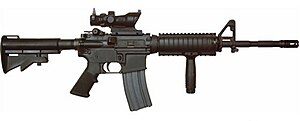M4A1 Carbine
| Carbine, 5.56 mm, M4 | |
|---|---|

Colt M4A1 Carbine with ACOG optic and a foregrip
|
|
| Type | Carbine |
| Place of origin | United States |
| Service history | |
| In service | 1994–present |
| Used by | See Users below |
| Wars | |
| Production history | |
| Designed | 1984–1993 |
| Manufacturer | See Manufacturers below |
| Unit cost | $700 (avg. cost) |
| Produced | 1993–present |
| Variants | M4A1 Mark 18 Mod 0 CQBR |
| Specifications | |
| Weight | 6.36 lb (2.88 kg) empty 7.5 lb (3.4 kg) with 30 rounds |
| Length | 33 in (840 mm) ( extended) 29.75 in (756 mm) (stock retracted) |
| Barrel length | 14.5 in (370 mm) |
|
|
|
| Cartridge | 5.56×45mm NATO |
| Caliber | 5.56 mm (.223 in) |
| Barrels | 1 |
| Action | Gas-operated, rotating bolt (Direct impingement) |
| Rate of fire | 700–950 round/min cyclic |
| Muzzle velocity | 2,970 ft/s (910 m/s) (M855A1 round) |
| Effective firing range | 500 m (550 yd) |
| Feed system | 30-round box magazine or other STANAG magazines. Magazines with different capacities also available. |
| Sights | Iron sights or various optics |
The M4 carbine is a shorter and lighter variant of the M16A2 assault rifle. The M4 is a 5.56×45mm NATO, air-cooled, direct impingement gas-operated, magazine-fed carbine. It has a 14.5 in (370 mm) barrel and a .
The M4 carbine is heavily used by the United States Armed Forces and is largely replacing the M16 rifle in United States Army and United States Marine Corps combat units as the primary infantry weapon.
The M4 is also capable of mounting the M203 and M320 grenade launchers. The distinctive step in its barrel is for mounting the M203 with the standard hardware. The M4 is capable of firing in semi-automatic and three-round burst modes (like the M16A2 and M16A4), while the M4A1 is capable of firing in semi-auto and full automatic modes (like the M16A1 and M16A3).
Following the adoption of the M16 rifle, carbine variants were also adopted for close quarters operations. The CAR-15 family of weapons served through the Vietnam War. However, these carbines had design issues, as "the barrel length was halved" to 10 inches which "upset the ballistics", reducing its range and accuracy and "led to considerable muzzle flash and blast, so that a large flash suppressor had to be fitted". "Nevertheless, as a short-range weapon it is quite adequate and thus, (despite) its caliber, (the XM177 "Commando") is classed as a submachine gun." In 1988, Colt began work on a new carbine design called the XM4 combining the best features of the Colt Commando and M16A2 rifles.
...
Wikipedia
